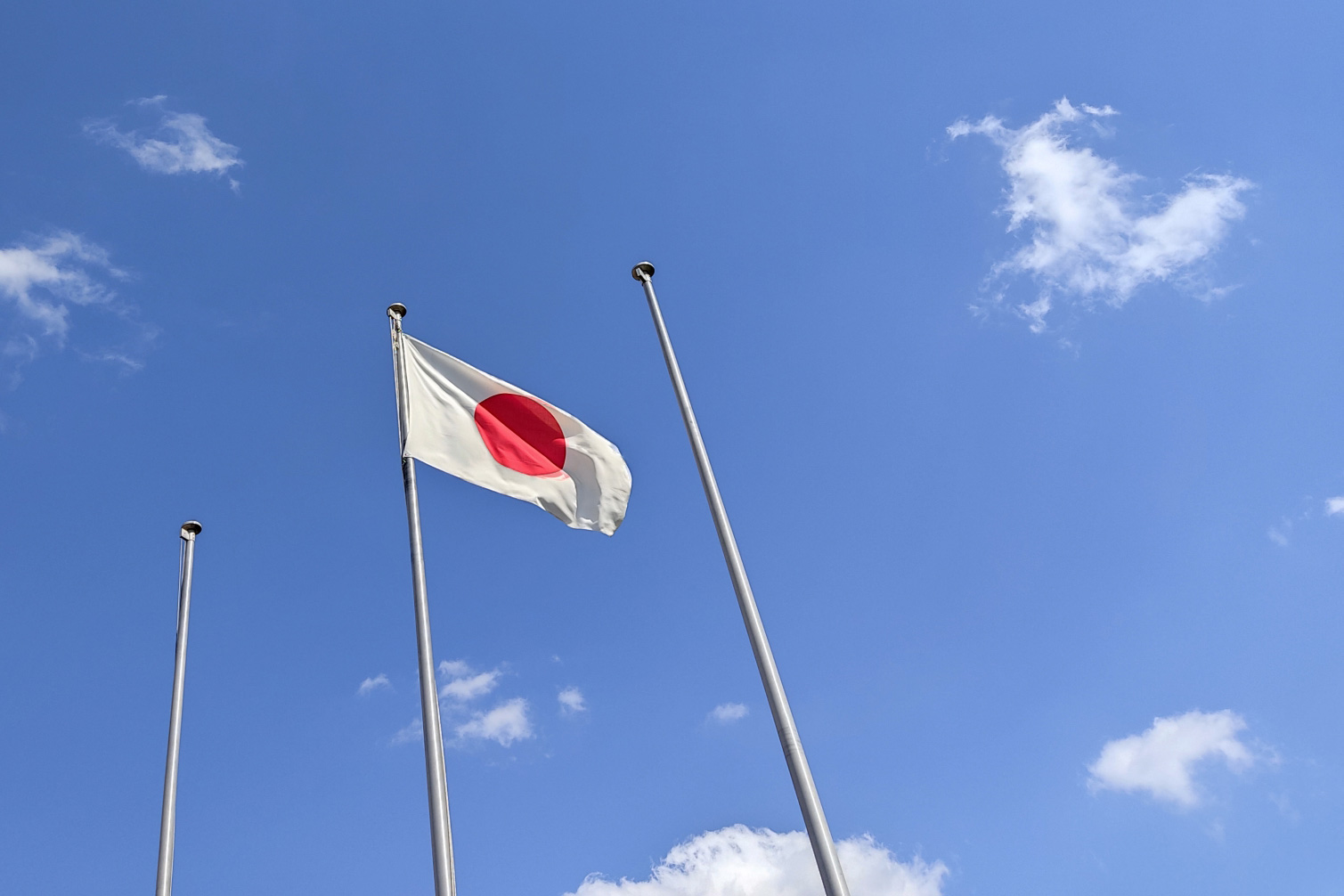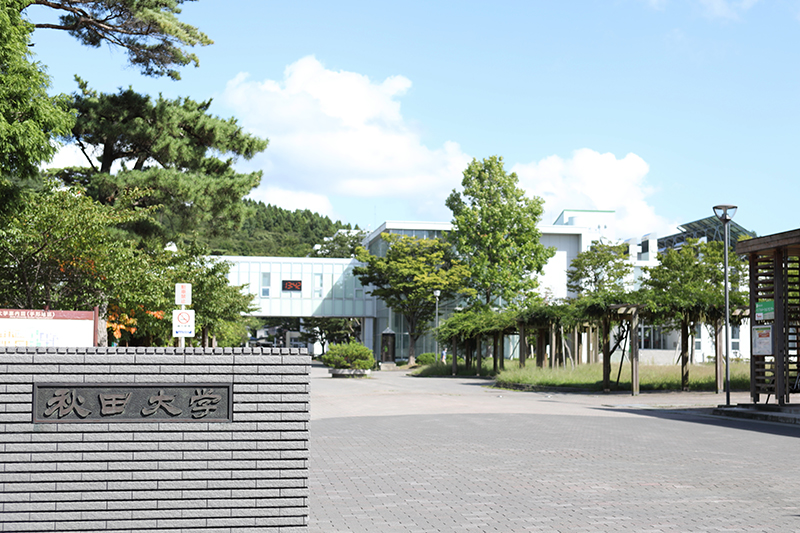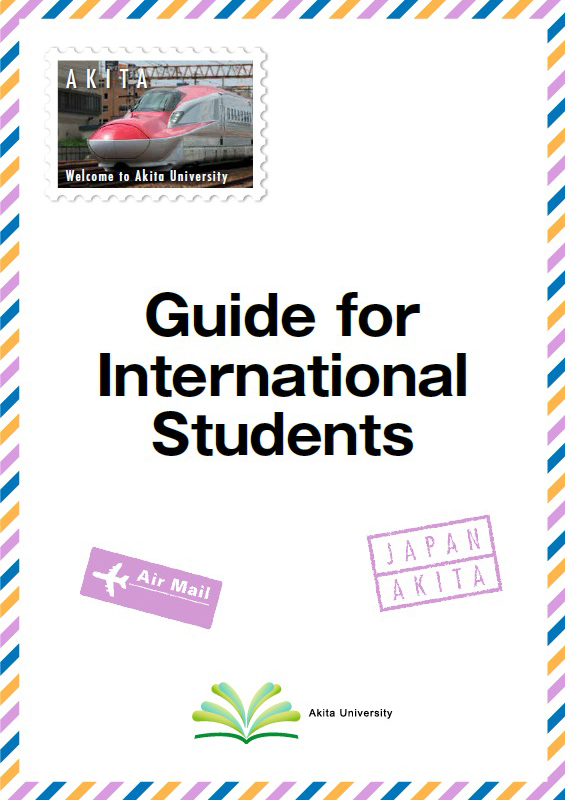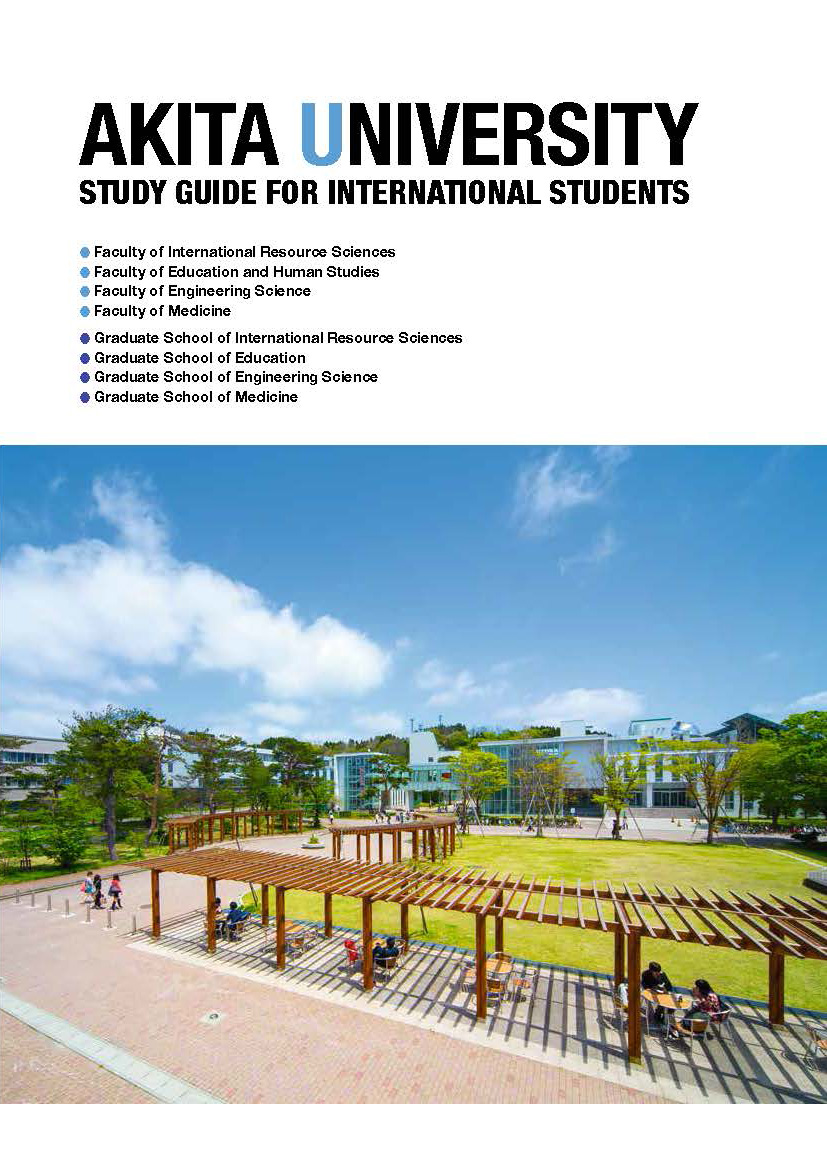Information on Studying at Akita University
Various Study Abroad Programs
Types of Study Abroad Programs
Akita University offers various programs for international students. Please take a look at the features of each program and use them as a reference to select the program that best suits your purpose of study abroad.
For degree-seeking students
I would like to acquire a degree.
Undergraduate students
4 years
Graduate students
(Master’s Program)
2 years
Graduate students
(Doctoral Program)
3 years
For non-degree seeking students
I would like to obtain credits for a specific course. I would like to engage in research. I would like to prepare for graduate school.
Non-degree students
6 months to 1 year
Research students
6 months to 1 year
I would like to experience a short-term study abroad.
Exchange students
5 months or 11 months
I would like to take an intensive course on Japanese language and culture.
Japanese studies students
11 months
I would like to take an intensive course to learn about school education in the field in Japan.
Teacher training students
1.5 years
Study abroad program comparison chart
| Study abroad type |
Undergraduate students |
Graduate students (Master’s Program) |
Graduate students (Doctoral Program) |
Exchange students |
Japanese studies students |
Teacher training students |
Non-degree students |
Research students |
|---|---|---|---|---|---|---|---|---|
| Standard years of study |
4 years (6 years for medical students) |
2 years | 3 years (4 years for medical majors) |
5 months or 11 months |
11 months | 1 year and 6 months |
1 year or less | 1 year or less |
| Required education |
High school graduate |
Undergraduate degree |
Master’s degree |
Enrolled in an overseas partner university |
Majored in Japanese language and culture at an overseas partner university or an overseas university |
Current teacher with more than 5 years of experience |
High school graduate or have an undergraduate degree or master’s degree |
Undergraduate degree or master’s degree |
| Affiliation | Faculties | Graduate schools |
Graduate schools |
Faculties | Faculty of Education and Human Studies |
Graduate School of Education |
Faculties and graduate schools |
Faculties and graduate schools |
| Status | Regular students | Non-regular students | ||||||
| Start of study abroad |
April | April or October |
April or October |
April or October |
October | October | April or October |
April or October |
| Eligibility for dormitory residence |
Eligible | |||||||
| Japanese language courses | Available(Not available only for Japanese language courses) *For details, please refer to Akita University General Program. |
|||||||
| Languages the classes are taught in |
Faculty of International Resource Sciences: Japanese for the first year, English for specialized subjects in the second year and above Graduate School of International Resource Sciences: English Other faculties and graduate schools: Japanese (partly in English) |
|||||||
If you are using a smart phone, please click here to view the PDF file.
Study abroad program comparison chartPDFTypes of international students
There are two types of international students: government-sponsored students and privately-financed students. Government-sponsored students are international students who receive a scholarship from the Japanese government (MEXT) to study in Japan. On the other hand, all international students other than government-sponsored students are referred to as privately-financed students.
Privately-financed international students
The university accepts “undergraduate” and “graduate students” for degree purposes, as well as “exchange students”, “non-degree students”, and “research students” for non-degree purposes.
If you wish to be a degree-seeking "undergraduate" or "graduate" student:
You must take and pass the entrance examination administered by Akita University. For information on entrance examinations, please refer to the Akita University Entrance Examination Portal Site.
If you wish to be an "exchange student":
It is a prerequisite that you are enrolled in an overseas partner university with which Akita University has a memorandum of understanding for student exchange. For details, please refer to the Student Exchange Programs page.
If you wish to be an "exchange student":
Please contact the following sections.
Faculty of International Resource Sciences
International Resource Sciences Section, General Academic Affairs Division
:(+81)-(0)18-889-2236
Faculty of Education and Human Studies
Education and Human Studies Section, General Academic Affairs Division
:(+81)-(0)18-889-2512
School of Medicine, Faculty of Medicine
School of Medicine Section, Academic Affairs Division, Faculty of Medicine
:(+81)-(0)18-884-6030, 6232
School of Health Sciences, Faculty of Medicine
School of Health Sciences Section, Academic Affairs Division, Faculty of Medicine
:(+81)-(0)18-884-6505
Faculty of Engineering Science
Engineering Science Section, General Academic Affairs Division
:(+81)-(0)18-889-2312
Government-sponsored international students
Government-sponsored international students are international students who receive a scholarship from the Japanese government (MEXT) to study in Japan. For more information about this program and the application guidelines, please check the MEXT website.
Types of govemment-sponsored international students accepted by Akita University
(? indicates that the university is recruiting and selecting applicants; - indicates that the university is not recruiting or selecting applicants.)
| Category | Recruitment from overseas |
||
|---|---|---|---|
| Embassy recommendation |
University recommendation |
||
| Graduate School | Research students | ? | ? |
| Teacher training students | ? | - | |
| Undergraduates | International students | ? | - |
| Japanese studies students | ? | ? | |
Recommendation and selection of Japanese government (MEXT) scholarship students
There are two methods of recommendation and selection for Japanese government (MEXT) scholarship students.
Embassy recommendation
Recruitment and recommendation by an overseas Japanese embassy or consulate general

Please contact the Japanese embassy or consulate general in your country for information on the selection schedule and application procedures for the year you wish to be recommended by the embassy.
University recommendation
Recruitment and recommendation by Akita University based on an inter-university agreement

Priority for university recommendations will be given to students who are enrolled in or graduated from Akita University’s overseas partner universities. If you wish to be recommended by a university, and you are a current or former student of one of our partner universities, please contact Akita University through your academic advisor.
Related materials
Akita University General Program
Akita University offers a study program for all international students called "Akita University General Program". International students can take Japanese language courses according to their respective Japanese language levels.
Target Students and Objectives
| Target Students | Main objectives |
|---|---|
International students who wish to improve their Japanese proficiency and pursue their goals to finish their undergraduate courses or graduate studies at Akita University |
To be able to understand lectures and take notes in Japanese; To be able to write papers and technical reports in Japanese; To be able to participate in discussions in Japanese. |
International students who wish to concentrate on Japanese studies, including the language and other aspects of Japanese culture at the upper college level |
To be able to understand lectures and take notes in Japanese; To be able to write papers and technical reports in Japanese; To be able to participate in discussions in Japanese. |
International students who are enrolled in master’s or doctoral courses in English and researchers |
To obtain basic communicative skills for daily life in Akita. |
Japanese Language Courses
| 1st semester | 2nd semester | Contents | Period(s)/week (1 period = 90-minute class) |
Main Participants | Japanese language level |
|---|---|---|---|---|---|
Japanese 1A |
Japanese 1B | Same | 4 | Beginner | Students who have never learned or have just begun to learn Japanese |
Japanese 2A |
Japanese 2B | Same | 4 | Elementary | JLPT N5 or the equivalent Japanese competence |
| Japanese 2 SOGO A |
Japanese 2 SOGO B |
Same | 1 | ||
| Japanese 3A | Japanese 3B | Same | 4 | Low-Intermediate | JLPT N4 or the equivalent Japanese competence |
| Japanese 3 SOGO A |
Japanese 3 SOGO B |
Same | 1 | ||
| Japanese 4-Ⅰ | Japanese 4-Ⅱ | Different | 2 | Intermediate | JLPT N3 or the equivalent Japanese competence |
| Japanese 4-Ⅲ | Japanese 4-Ⅳ | Different | 2 | ||
| Japanese 4-Ⅴ | Japanese 4-Ⅵ | Different | 1 | ||
| Japanese 5-Ⅰ | Japanese 5-Ⅱ | Different | 1 | Advanced | JLPT N2 or the equivalent Japanese competence |
| Japanese 5-Ⅲ | Japanese 5-Ⅳ | Different | 1 | ||
| Japanese 5-Ⅴ | Japanese 5-Ⅵ | Different | 1 | ||
| Japanese 5-Ⅶ | Japanese 5-Ⅷ | Different | 1 | ||
| Japanese 5-Ⅸ | Japanese 5-Ⅹ | Different | 1 |
Timetable and Classroom
The timetable and classrooms for each class vary from semester to semester. The latest information will be posted on the What's New page.





